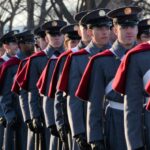“My generation just had thicker skin. These young kids today are getting caught in the moment. They take it more personally,”
Those are the comments of Ron Carter, the first Black battalion commander at the Virginia Military Institute (VMI). Carter was a star basketball player for the Keydets. He was drafted by the Los Angeles Lakers, and eventually VMI retired his jersey. He later served as an administrator with the Department of Housing and Urban Development. That’s the resume of an adult with accomplishments.
Those are not the comments you want to hear, if the commenter (Carter, in this case) is commenting on your behavior, judgements and temperament. They are especially not the comments you want to hear if you’re the graduate of an institution that prides itself on training future leaders. A place like VMI.
I am not a VMI man I’m a Virginia man; I graduated from the University of Virginia. But for much of my professional career, I’ve either been an Army officer or taught them. For much of the past 20 years, I’ve taught Army lieutenants and captains. And, if I were an VMI graduate, or prospective Keydet, I’d be really concerned about the impact of this past year’s hysteria on my school’s reputation.
I grew up in Virginia, and my mom is from outside of Lexington. She dated a cadet in high school. (To liven up family discussions, she’d occasionally make comments about the “cold brass buttons” of VMI uniforms, and watch my father, a non-VMI man, frown.) VMI was always special to us. We saw it as a unique, powerful part of Virginia culture. We still do.
But, once you leave the Old Dominion and go out into the wider world, you’ll find that VMI becomes just another military college. My experience in the Army, as a teacher of officers and an officer myself, is this: when soldiers consider an officer’s background, they think of three basic groups — West Pointers, Officer Candidate School graduates, or ROTC graduates from regular colleges. Military schools besides West Point tend to be viewed as just another ROTC commissioning source. Also, they tend to be viewed equally. VMI graduates aren’t any more special than graduates of the Citadel, Norwich, North Georgia College (now the University of North Georgia) or the cadet corps at Virginia Tech. To the typical Army lieutenant or captain- — or sergeant or private — they all blend together.
But that may be changing. And, not in a way that’s good for VMI.
Across America, people are rebelling against “wokeness.” They’re rising up to fight Critical Race Theory, and other assaults on America’s history and heritage. They are rejecting the shallow and narrow thinking that drives cancel culture and spawned assaults on visible signs (statues, building names) of American heroes. They recognize that many of America’s great figures had major flaws –but that doesn’t mean they weren’t great. They have heard, and are heeding, the warning of womens’ rights and anti-cancel culture activist Ayaan Hirsi Ali, who told Congressman Dan Crenshaw that we are “litigating people in the past, using the moral framework of today.” They want leaders who think broadly and deeply, and make decisions based on reason instead of emotion.
Carter’s comments at the top of this article came from a Washington Post article on April 26th. In that article, he said, in the Post’s words, that “VMI’s current cadets of color have been swayed too much by Black Lives Matter and police brutality protests.”
What sergeant or private wants to be led by officers who can be swayed? What boss wants to hire a management trainee who (to paraphrase Carter) might be thin-skinned, takes things personally and is prone to getting caught in the moment? The questions answer themselves.
VMI risks establishing a unique identity for itself, amongst American civilian military colleges: the woke military academy, which creates snowflakes instead of leaders. That may not be fair, but neither is life. Good leaders know that.
Donald Smith is a graduate of the University of Virginia and the Joint Military Intelligence College. A native of Richmond, he a retired Army Reserve officer.



